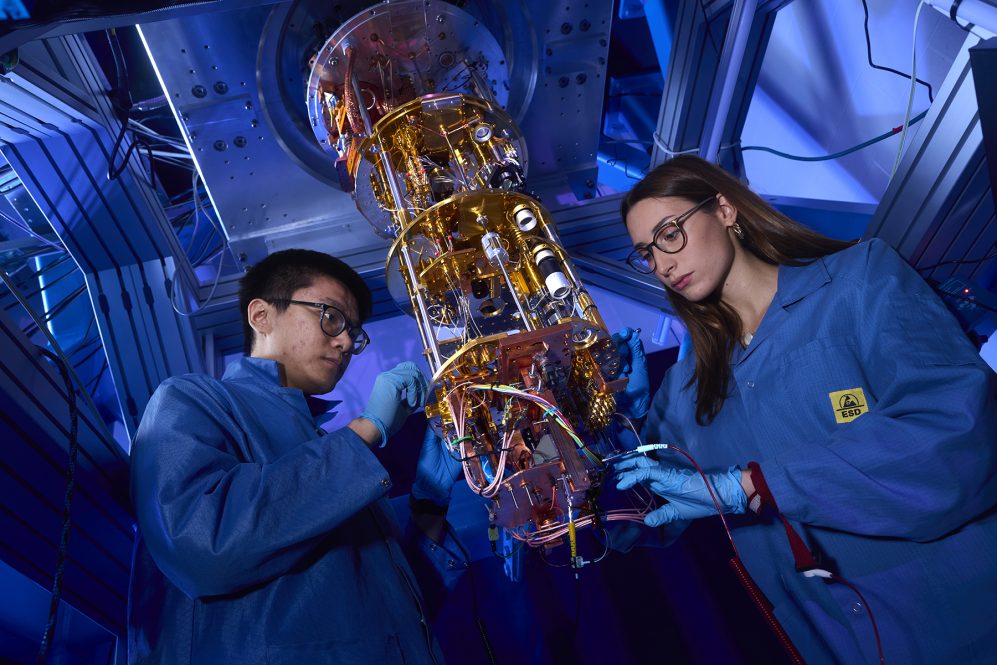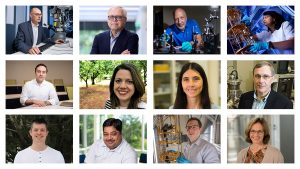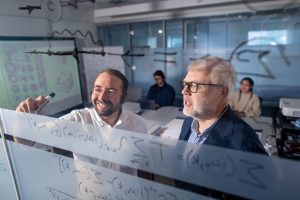The University has more than 80 faculty researchers across several schools and colleges who are involved in quantum-related projects

UConn's Quantum Alliance unites researchers across disciplines. Photo by Coppola Photography.
While "quantum" has become a buzzword representing cutting-edge and new technology, UConn has been active in related research stretching back decades.
About two years ago, UConn brought together groups of faculty members dispersed across different schools who work in quantum and quantum-adjacent areas to come together under one platform to exchange ideas, collaborate, and apply for interdisciplinary grants.
Now, with an important National Science Foundation (NSF) visit pending in December, that interdisciplinary consortium of researchers has been formalized as the UConn Quantum Alliance.
"Quantum is by no means a new concept and UConn has been a leader in research of quantum science, technology, and applications for a long time," says Pamir Alpay, interim Provost and Executive Vice President for Academic Affairs. "Quantum technology has the potential to revolutionize technologies across the spectrum. We have been at the forefront of research that can unlock full potential."
The Quantum Alliance includes 83 UConn faculty members who integrate quantum principles into their research or seek to advance the field. While UConn Quantum Alliance will play a major role in the statewide quantum initiative, it is independent from QuantumCT, a collaboration that UConn and Yale lead designed to advance Connecticut as a national quantum accelerator.

Interdisciplinary work is at the heart of the Quantum Alliance. Sanjeev Nayak, a materials science expert and quantum specialist who manages the consortium, says that research cuts across at least 13 different UConn departments, including UConn Health, which has a significant representation. Areas of concentration include computing and cybersecurity, pharmaceutical and biotechnology, aerospace and defense, fintech, and energy security.
"Quantum is not new at UConn, but it has evolved in the past couple of years," says Nayak. "We want to utilize our departments to embrace excitement at UConn by putting our quantum research under one banner."
Nayak continues that the Alliance is making progress toward breaking down the disciplinary silos that prevent collaboration. As a result, researchers are finding partners in grant proposals and other funding requests, benefiting their own research as well as UConn's overall output and excellence.
Defining Quantum
While the term "quantum" may sound familiar, its meaning and applications are sometimes shrouded in misunderstanding. The roots of the theory go back more than 100 years.
Quantum physics (also known as mechanics) describes the smallest, most fundamental things in our universe, such as subatomic particles. Researchers theorize that particles in the quantum world act differently than in classical physics. Instead of binary yes/no answers, there are many possibilities of how particles will react when faced with barriers and other variables.
In the 2023 UConn Research report, theoretical physics Professor Alexander Balatsky, one of the main organizers of the Quantum Alliance, explained "in the quantum world, rules on what is possible are drastically different from our everyday expectations."
Physics Professor Lea Ferreira dos Santos says that the expansion of quantum knowledge has helped bring technology to concepts originally explained by the likes of Albert Einstein.
"In everyday life, objects behave either like particles, such as bullets, or like waves, such as those in the ocean," dos Santos says. "In contrast, quantum objects have a dual nature: they spread like waves as they move through space yet behave as particles when we measure them.
"Even more fascinating is what happens when two quantum objects become entangled," she continues. "They share information in a profound way: measuring one instantly reveals the state of the other, no matter how far apart they are. Einstein famously called this 'spooky action at a distance,' and today we are learning how to use it to build powerful new technologies."
Building a Quantum Ecosystem
Building quantum knowledge requires collaboration across many different disciplines, says Bianca Montrosse-Moorhead, a professor of educational psychology. An institution such as UConn is ideal for the challenge, especially given the number of researchers involved in quantum projects and students eager to learn skills that will lead to good careers.

"UConn is a unique place," she says. "There are very few environments like this, where students can come and get the knowledge they need in quantum. What they learn here will have positive ripple effects for Connecticut and the country."
One of the University's important goals surrounding quantum is to educate and prepare the workforce for the jobs that will drive Connecticut's future economy. Quantum technology and artificial intelligence weigh heavily into that mission, and education expands beyond UConn.
Orthodontics Professor Caroline Dealy of the UConn School of Dental Medicine is leading efforts to build a statewide quantum ecosystem as chair of QuantumCT Workforce Development and Education. Estimates are that Connecticut and, by extension, UConn, needs to educate at least one million more STEM workers in the next decade to answer demand for high tech employment. Among other initiatives, the Quantum Alliance is extending programs to students of all ages and providing valuable training to teachers.
"There's no age limit to quantum literacy - the UConn Quantum Alliance has even extended programs for second graders," Dealy says. "On the other end of the spectrum, the Alliance has offered training workshops for professional workers to facilitate upskilling and pivots into quantum-adjacent jobs in insurance and manufacturing. Through partnership with technical high schools and technical training programs, the UConn Alliance will also develop curricula for quantum literacy necessary for entry level technician jobs."
NSF Visit
NSF leaders are scheduled to visit Connecticut in early December for a high stakes evaluation of the QuantumCT proposal. UConn and Yale are partners leading a statewide network of collaborators seeking an extraordinary grant to push Connecticut as the nation's leading quantum accelerator. The State of Connecticut has made significant commitments to advance the QuantumCT initiative.
Alpay is the leader of the proposal with co-PIs from Yale, Southern Connecticut State University, and others from UConn, including Montrosse-Moorhead.
The proposal is one of 15 national finalists for coveted NSF Regional Innovations Engines Program grants. The awardees will receive an initial two-year NSF grant of up to $15 million and will be eligible for funding for an additional eight years, for a total maximum award of $160 million over 10 years. NSF previously awarded the QuantumCT initiative a $1 million development grant through UConn, which launched numerous related projects now underway at UConn, Yale, and throughout Connecticut.
The QuantumCT team, including UConn, Yale and several state and industry partners, will host the NSF in Connecticut. The full scope of the University's quantum capital will be presented, with the Alliance playing an important role as the interdisciplinary hub for quantum research.
University leadership is looking forward to the visit as an opportunity to showcase its research and educational initiatives in quantum. Up to 10 proposals could be awarded grants, with an announcement anticipated in early 2026.
UConn's Technology Commercialization Services (TCS) is overseeing the Quantum Alliance. TCS is also working with business startups and other partners to push innovations that will have a significant impact on the state's workforce and invention capital.
"We are seeing in real time how some of Connecticut's biggest and most influential sectors are implementing quantum to improve infrastructure, health, finance, national security, and so many others," says Abhijit Banerjee, UConn's Associate Vice President for Innovation and Entrepreneurship. "UConn has been a part of that implementation for a long time, yet we are just scratching the surface of quantum's full impact on our state and society."






